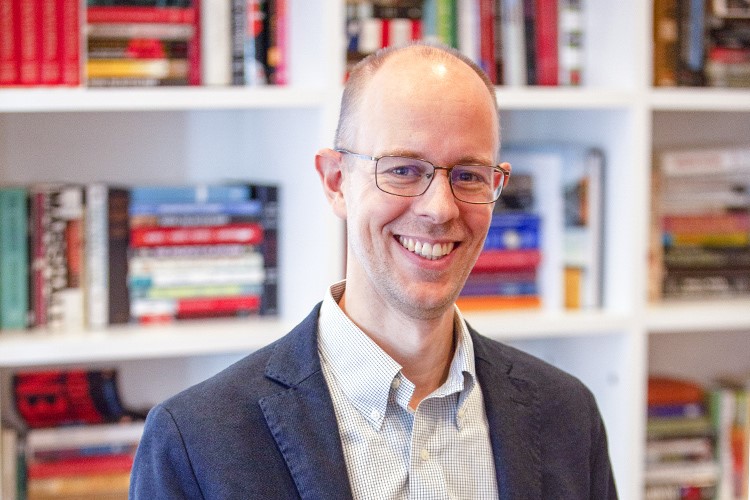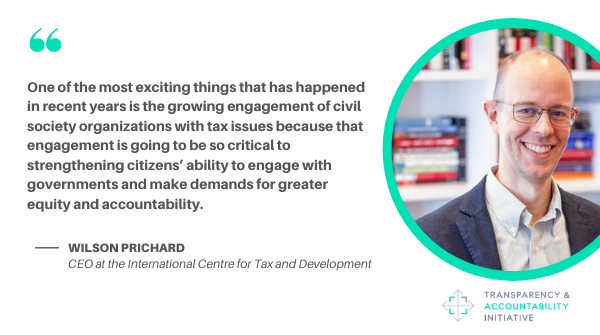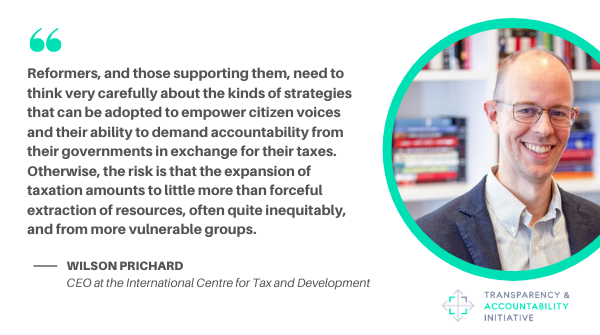Dr. Wilson Prichard is an Assistant Professor at the University of Toronto, Research Fellow at the Institute of Development Studies, and CEO of the International Centre for Tax and Development (ICTD). His research focuses on the relationship between taxation and citizen demands for improved governance in Sub-Saharan Africa.
We engaged Wilson further on his work on taxation and political economy in sub-Saharan Africa and the growing engagement of civil society organizations on tax issues. His remarks focused on the challenges and opportunities for taxation in sub-Sahara Africa, their impact and potential for greater equity and accountability, and the future of tax expansion on the continent.

Wilson Prichard. Photo Credit: IInternational Centre for Tax and Development (ICTD)
- Please tell us a little bit about yourself and what first motivated you to work on transparency and accountability issues around taxation?
My interest in studying tax issues is grounded in the belief that effective tax systems can be the foundation for constructing relationships of accountability between governments and taxpayers and constructing more effective state institutions. However, while this is possible, it is not guaranteed: governments may – and often do – extract revenue relatively arbitrarily and inequitably from those who are least able to demand accountability in return. Whether or not the expansion of taxation in lower-income countries contributes to broader improvements in development outcomes depends critically on how taxes are collected and what spaces there are for citizen voices to be heard in that process. So my initial interest in studying tax issues was rooted in a desire to understand how tax systems could be made more equitable and transparent. Thus, it became more likely to serve the taxpayer’s needs, contribute to the construction of accountability relationships, and foster more effective and inclusive state institutions.
- Your research has focused on relationships between taxation and citizen demands for improved governance in sub-Saharan Africa. What significant changes have you seen over the years? And what other changes would you expect in the next few years?
When I began my Ph.D. research in 2006, looking at the potential for taxation to spur and support citizen demands for accountability was still a relatively understudied topic, and the central ideas were almost entirely absent from policy debates. That began to change in the years that followed, thanks in significant part to work done by my Ph.D. supervisor, Mick Moore. It was particularly beginning in around 2010 that I think these ideas began to break into the policy realm and attract broad research attention. That was reflected, for example, in those ideas featuring centrally in the founding of the International Center for Tax and Development, and in publications from the OECD, the IMF, and others that pointed toward the potential links between taxation and expanded accountability. To my mind, Mick was the driving force behind much of that and creating expanding space for the work I was doing as well.
 Looking to the future, I think it is fair to say that there is now a very broad appreciation of how the expansion of taxation can contribute to strengthening citizen demands for accountability. But it is possible that our efforts to raise that idea up the policy agenda were almost too successful – I mean, a lot of people began to take for granted the idea that expanding taxation would have these broader benefits for society. I think the key challenge now is to recognize that while the expansion of taxation may have these positive effects, it is not guaranteed to do so. Reformers, and those supporting them, need to think very carefully about the kinds of strategies that can be adopted to empower citizen voices and their ability to demand accountability from their governments in exchange for their taxes. Otherwise, the risk is that the expansion of taxation amounts to little more than forceful extraction of resources, often quite inequitably, and from more vulnerable groups.
Looking to the future, I think it is fair to say that there is now a very broad appreciation of how the expansion of taxation can contribute to strengthening citizen demands for accountability. But it is possible that our efforts to raise that idea up the policy agenda were almost too successful – I mean, a lot of people began to take for granted the idea that expanding taxation would have these broader benefits for society. I think the key challenge now is to recognize that while the expansion of taxation may have these positive effects, it is not guaranteed to do so. Reformers, and those supporting them, need to think very carefully about the kinds of strategies that can be adopted to empower citizen voices and their ability to demand accountability from their governments in exchange for their taxes. Otherwise, the risk is that the expansion of taxation amounts to little more than forceful extraction of resources, often quite inequitably, and from more vulnerable groups.
In that spirit, one of the most exciting things that has happened in recent years is the growing engagement of civil society organizations with tax issues because that engagement is going to be so critical to strengthening citizens’ ability to engage with governments and make demands for greater equity and accountability.
- Drawing from your experience working on taxation and development initiatives, what are the challenges from working in this field, and what have you found most useful in building a stronger and equitable society?
I would highlight two challenges in particular, which are closely related.
The first is the depth of resistance to the expansion of more effective taxation, particularly the strength and effectiveness of that resistance among relatively wealthy groups. We know without any doubt that the relatively wealthy in lower-income countries pay only a fraction of the taxes that they should. In turn, there are clear and widely understood ways in which those outcomes could be improved. But despite that, progress in strengthening progressive taxation of income and wealth has often been painfully difficult and slow, with powerful people finding ways to resist both more progressive policy measures and more effective enforcement of existing rules. The end result is that despite lots of good ideas about how to reform tax systems, tax systems remain far less progressive than they should be, and revenue-raising remains far below the levels needed to finance sorely needed goods and services.

The second is the difficultly of mobilizing positive popular support for more effective and progressive taxation. In principle, we would expect low and middle-income groups across low-income countries should be strongly in favor of strengthening progressive taxation of the better off, who currently pay a fraction of what they should. Yet, in practice, mobilizing popular support for those reforms has been rare. In part, I think this reflects a lack of trust in the government: if you don’t believe the governments will use revenue well, you may not support any kind of taxation. I think it also reflects the fact that tax issues have for so long – particularly in low-income countries – been understood as highly technical questions reserved for debate and decision-making by technical experts. As a result, taxpayers feel that they don’t have the right or the knowledge necessary to engage in tax debates and demand better and more equitable outcomes. Thus, one of our work goals has been to simplify tax debates to make them more accessible to taxpayers and pursue initiatives designed to empower taxpayer and civil society voices to engage more actively in these debates.
- What recommendations will you give your younger self or anyone starting in your area of expertise?
There are so many, but let me choose three:
- Don’t be intimated by often very technical discussions. Certainly, sometimes key questions are highly technical. But the core weaknesses of existing tax systems, and directions of needed reform, are often actually much simpler. Researchers, civil society, and taxpayers should have the confidence to engage in those debates and make their voices heard.
- Listen to those working on the front lines within tax administrations. Many of them are deeply committed to their work and have critical insights into what is not working – and what successful reform could look like.
- Try to work with good people who are committed to supporting positive change. One of my greatest good fortunes professionally, and otherwise, has been the chance to work with a tremendously committed and ethical group of people at the ICTD. And those values have translated into more meaningful and rewarding work.
- What would surprise someone about you?
Given how much time I spent talking in my new role, maybe the fact that I was terribly shy throughout high school – before beginning to find my voice, and my confidence, when I began working as an HIV/AIDS activist in University.
